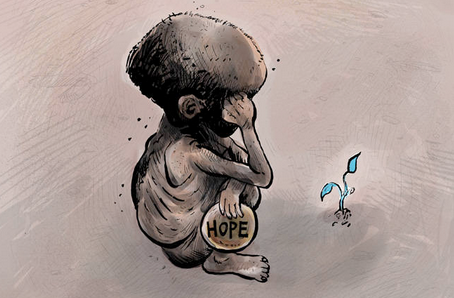List of Major causes of poverty in Africa and solutions
Almost half of the populations (220 million people) in sub-Saharan Africa live in poverty. This figure is projected to reach 400 million by the year 2017. This poverty has mainly been caused by poor economic growth, decreasing per capita income and low employment. Poverty has been worsened by HIV/AIDS epidemic, political instability, cultural conflict and ethnic cleansing. This paper analyzes the major causes of poverty in Africa and the solution to these causes.

Introduction
Africa has an estimated population of 1.1 billion people. The countries in Africa share many features like reliance on agriculture, experience to European colonialism, high rural population and absolute poverty. These nations emerged as independent country-states after the end of European colonialism.
Major causes of poverty in Africa
Misused money
Chitereka, (2008) notes that more than 500 billion dollars have been sent to African countries for the purpose of economic development; however, the money has brought little change in the long term. This might be because a large portion of the money is either spent in weapons which are bought from the developed countries. This brings no gain to the native inhabitants because the money is still sent back to developed nations. In addition, the large sums of money available in Africa are used to develop expensive projects, which bring little benefit in the long run. For instance, Ghana was the richest nation in Africa when it gained independence. But a few years later, it did not have any foreign reserves of any significance. Most of its money was spent on mega projects, which eventually became a waste of fund. An example is the Okasambo dam which had to cost billions of money in constructing it so as to provide electricity for the mining of aluminium from bauxite. However, the ores were discovered to be of too low grade and; therefore, the entire project became a waste of money.
Corruption
The high poverty levels in Africa have also been caused by corruption. A survey conducted by world anti-corruption revealed that there were very high corruption cases in African nations. Among the respondents who were interviewed 42 percent of them confirmed that they were asked to give bribe in order to be employed. Countries in Africa that were reported to have the highest incidences of corruption were Nigeria, Senegal and Cameroon (Akindola, 2010). This is due to the fact that many people in Africa believe that family relations are more essential than country identity. Therefore, those in power use bias and bribery for the gain of their relatives at the expense of their country. An example is the existing Zimbabwe situation. The president of Zimbabwe, Doctor Robert Mugabe and his close allies are cashing the nation’s resources at the expense of the entire nation. At the moment, Zimbabweans are among the poorest individuals globally due to corruption practices of Robert Mugabe’s rule.
Conflict
Africa is among those continents with unending conflicts. Among the conflicts that exist in Africa include civil wars, for instance Somalia, conflicts between nations, for instance, Eritrea and Ethiopia border wars and the continuing civil wars in Nigeria and Sudan’s Darfur area. This creates untold desolation and poverty among inhabitants.
Natural Disasters
Continuous natural disasters like floods and drought have affected rural area inhabitants. For instance, in 2006, Lesotho (the southern African region) underwent the worst droughts in 30 years, which forced the government to declare it a national disaster. On the other hand, Mozambique has also been experiencing floods, which have impoverished its people.
Overpopulation
Overpopulation is a severe problem in Africa which has worsened the level of poverty. There is low unemployment due to lack of enough employment opportunities. Therefore, the number of people depending on those who are employed is so high which leaves a majority of the people in poverty. For instance, when calamities like famine occur the high need for food in well-off cities draws foods from needy areas leaving the aged, the incapacitated and children in poverty.
Dependency syndrome
The dependency syndrome in Africa established its beginning after the gaining of independence, which has resulted to poverty. The dependence syndrome involves looking for aid from donors. People in Africa are always looking outside for other people to help them. This has made people to lose the skill of being enterprising. Therefore, if there are no donors they remain wallowing in poverty.
Possible solutions to poverty in Africa
A viable reduction of poverty in Africa calls for the forming of proper poverty policy environment and allocating large volumes of resources to education sectors. This requires to be supported by implementing better government policies that prevent corruption. On the other hand, in order to reduce the level of poverty in Africa mechanism should be put in place to educate its inhabitants to be industrious and avoid relying on donors. Moreover, poverty can be reduced in Africa by empowering the poor. The major constituent of empowerment that must be in organized reform is the ability for the poor to access information. Information enables people to take advantage of emerging chances and exercise their rights. This also enables them to hold the state accountable in case of any wrongdoing.
In conclusion, this paper has provided hypothetical groundwork on the question of the main cause of poverty in Africa. It has highlighted the foremost causes of poverty, which are misuse of money, conflict, corruption, over population and dependency syndrome. The possible solutions to these problems have also been discussed.
You can also browse our website for
- Factors that lead to poverty in south Africa
- causes of poverty in Kenya
- Causes of poverty in Sudan
- Causes of poverty in Somalia
- Causes of poverty in India
- Causes of poverty in Uganda
- Causes of poverty in Nigeria
[irp]
Do not all miss all our latest updates on the Causes of poverty in Africa and possible solutions
Leave a Comment